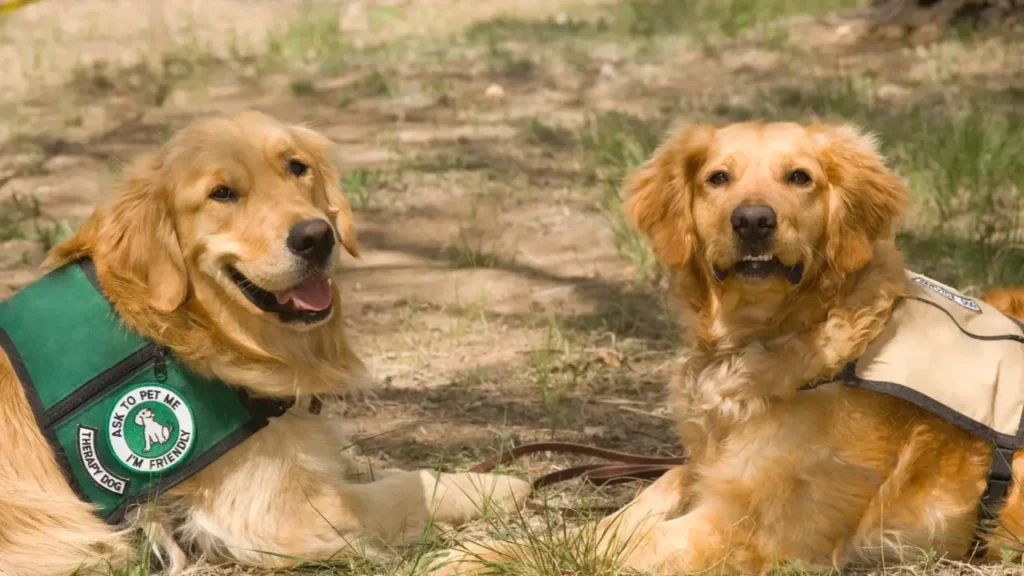
When it comes to enhancing your quality of life, the companionship of service dogs can be transformative.
If you’re in search of the best large breed service dogs, you’re seeking not just a pet.
You’re seeking a reputable and reliable partner trained to aid with various disabilities.
Among the top contenders in service dog breeds are the celebrated Labrador Retrievers, stately Golden Retrievers, and the venerable German Shepherd Dogs.
Each of these breeds brings a unique set of qualities that classify them as excellent service dogs.
Embodying the intelligence, patience, and dedication necessary to assist their handlers with everyday tasks and challenges.
Table of Contents
ToggleKey Takeaways
- Labrador Retrievers, Golden Retrievers, and German Shepherd Dogs are highly regarded as excellent service dogs.
- Choosing the right service dog breed is crucial for the specific needs and lifestyle of the handler.
- Best large breed service dogs are known for their intelligence and ability to perform a wide range of tasks.
- It’s important to look for reputable large breed service dogs from credible training programs or organizations.
- Diverse service dog breeds offer various forms of assistance, from mobility support to psychiatric help.
- The commitment and training behind a service dog are what establish them as more than a pet, but a lifeline for many.
Understanding the Role of Service Dogs
The value of service dogs in the lives of individuals with disabilities cannot be overstated.
These dedicated animals, through their training and devotion, provide essential support that enhances the independence and well-being of their owners.
Let’s delve into what defines a service dog and how they differ from other types of assistance animals.
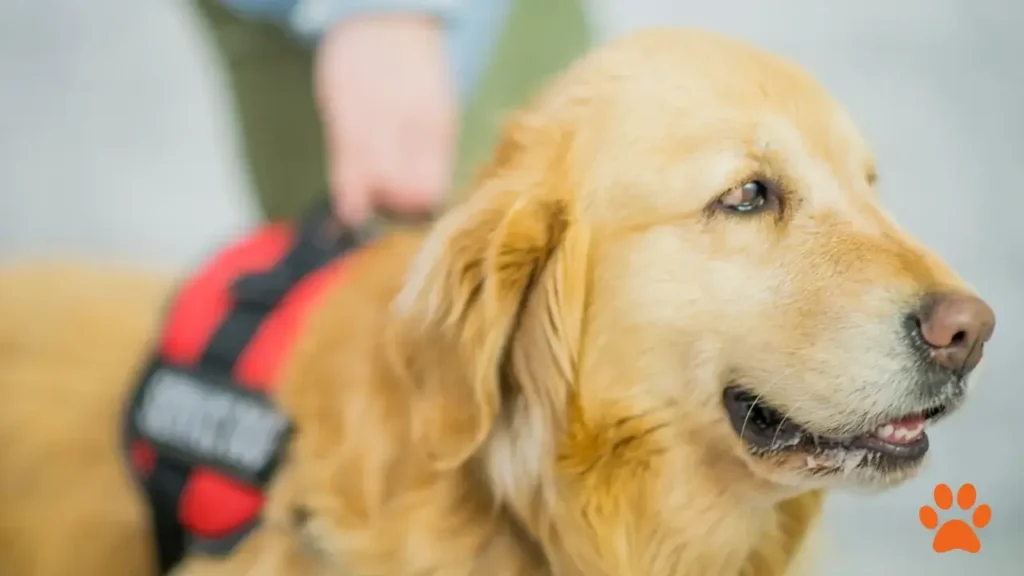
Defining a Service Dog
A service dog is not just any canine.
It’s a service animal trained to execute specific tasks to aid an individual with a disability.
These tasks are directly related to the person’s disability, enabling them to navigate day-to-day activities more independently.
The American with Disabilities Act (ADA) legitimizes the role of these assistance dogs.
Granting them access to public spaces where pets typically aren’t allowed, to ensure they can accompany their handlers wherever they go.
The Distinction Between Service Dogs, Emotional Support Animals, and Therapy Dogs
It’s critical to recognize that not all animals that provide support to humans are considered service dogs.
Emotional support animals offer companionship and can help alleviate the symptoms of mental and emotional conditions simply by their presence.
Similarly, therapy dogs are trained to provide affection and comfort to individuals in hospitals, retirement homes, and other therapeutic settings.
However, unlike service dogs, neither emotional support animals nor therapy dogs are trained to perform specific tasks for a disability.
Therefore, they do not have the same legal rights to public access as service dogs do.
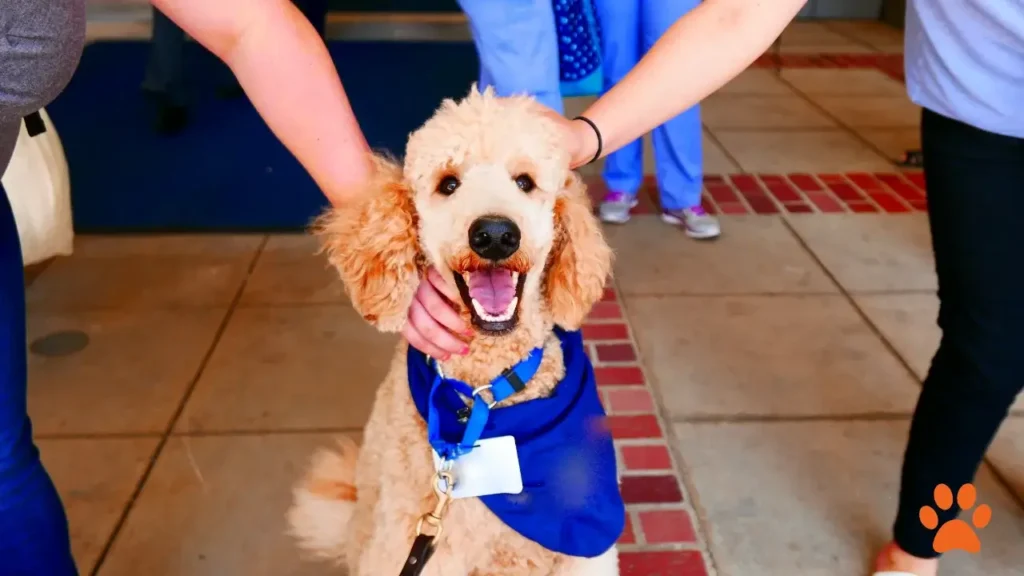
Tasks Service Dogs Perform for Owners with Disabilities
Service dogs are the companions that go the extra mile for their handlers.
Whether it’s a psychiatric service dog calming someone during an anxiety attack.
A mobility assistance dog fetching items.
A guide dog helping someone navigate city streets safely.
These dogs are equipped to handle a variety of critical tasks.
The unique capabilities of service dogs are indispensable for many individuals.
Offering not just functional assistance but emotional support as well.
Here’s a table outlining some of the varied tasks service dogs perform:
| Type of Service Dog | Tasks Performed |
|---|---|
| Guide Dogs | Navigate obstacles, provide safe travel |
| Hearing Dogs | Alert to sounds like alarms, doorbells, or crying babies |
| Mobility Assistance Dogs | Retrieve items, open doors, operate switches |
| Psychiatric Service Dogs | Interrupting harmful behaviors, providing deep pressure therapy |
| Seizure Response Dogs | Obtaining help, activating life-alert systems |
Whether you require the vigilant assistance of a psychiatric service dog or the steadying presence of a mobility assistance dog.
These types of service dogs are much more than pets.
They are skilled professionals, trained to offer tailored support to enhance your quality of life.
Characteristics of an Ideal Service Dog
When considering a service dog for support with daily tasks or for assistance with disabilities, recognizing the ideal traits that enhance their capabilities is crucial.
Service dogs are not just pets.
They are trained companions that perform specific roles to assist you in your everyday life.
What qualities should you look for to ensure you have an intelligent, responsive, and reliable assistant?
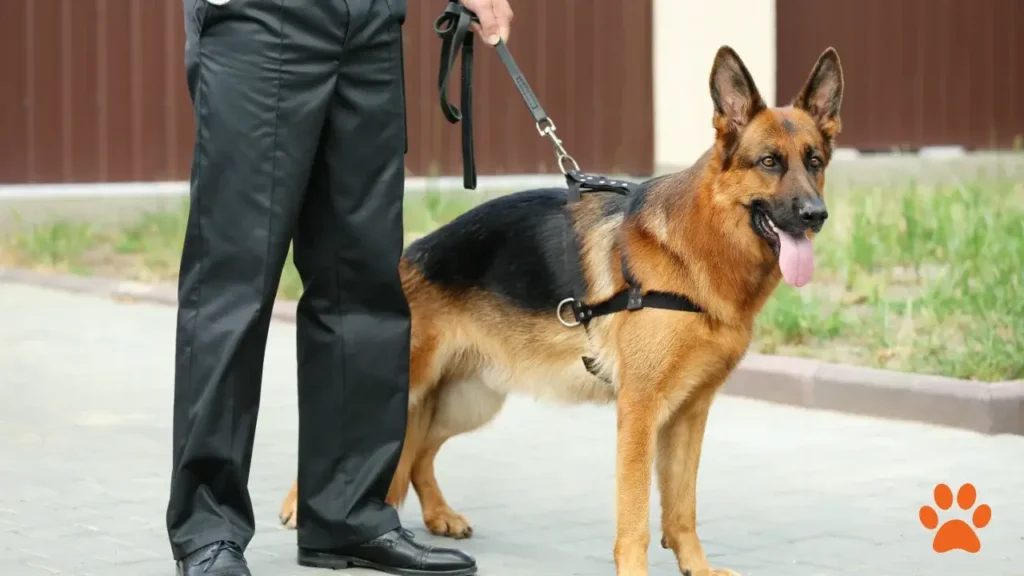
Intelligence and Trainability
At the core of dog training for service work lies a dog’s aptitude for learning.
Whether you’re in search of a guide for the visually impaired or a psychiatric service dog to mitigate mental health challenges.
Intelligent dog breeds tend to learn faster and respond better to training.
Training such working dogs involves patience and consistency, but with the right breed, the process can be smooth and ultimately rewarding.
Demeanor: Calmness Under Pressure
Service dogs frequently encounter high-stress environments and unexpected situations.
Those best suited to service roles maintain their composure, making them steadfast companions.
A dog that remains unflappable.
Whether it’s navigating through crowded streets or providing reassurance during a medical crisis, offers an invaluable sense of security to their handler.
Reliability and Focus in Various Environments
The reliability of a service dog is measured by its consistency in performance, regardless of the setting.
It is a trait that instills confidence in handlers who depend on their dog’s focus amid distractions.
Whether at home, in public, or in quieter settings.
A dependable service dog stays attuned to your needs.
Breeds renowned for this attribute typically excel in their roles and are a favored choice for individuals requiring dedicated service work.
| Breed | Intelligence Ranking | Suited Service Roles | Temperament |
|---|---|---|---|
| Labrador Retriever | High | Mobility Assistance, Psychiatric Service | Even-tempered, Adaptable |
| German Shepherd | Very High | Guide, Search and Rescue | Confident, Courageous |
| Golden Retriever | High | Therapy, Seeing-Eye | Friendly, Trustworthy |
The Most Suitable Large Breeds for Service Work
When it comes to service work, certain large breeds have distinguished themselves as the best service dog breeds.
These dogs are not only recognized for their considerable size which aids in tasks like mobility assistance, but also for their exemplary intelligence and temperament.
The breeds that stand out have proven their capabilities as psychiatric service dogs, guide dogs, and support dogs, fulfilling the needs of those they serve with devotion and skill.
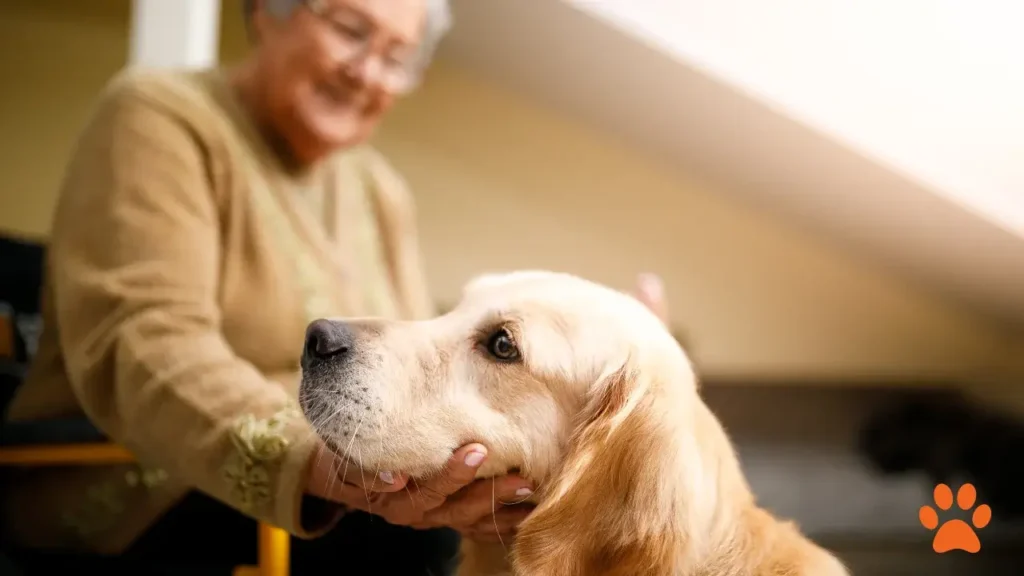
6 Best Large Breed Service Dogs
Large breed dogs bring a unique set of qualities that make them well-suited for various service tasks.
Let’s delve into the characteristics and roles of some top breeds known for their service work.
| Breed | Intelligence | Common Service Roles | Temperament |
|---|---|---|---|
| German Shepherd | Exceptional | Guide, Detection, Support | Loyal, Confident |
| Bernese Mountain Dog | High | Mobility Assistance | Gentle, Good-Natured |
| Standard Poodle | Outstanding | Psychiatric Support, Allergen Detection | Intelligent, Friendly |
| Great Dane | High | Balance Assistance, Psychiatric Support | Friendly, Patient |
Whether you are in search of a reliable guide for visual impairment
Or need a steadfast companion for psychiatric service.
There’s a large breed dog that can fulfill those needs.
The German Shepherd is a classic choice for those requiring a blend of intelligence and versatility.
If you need a dog that can lend physical strength for balance and mobility, the Bernese Mountain Dog could be your perfect match.
Looking for an intelligent canine with a hypoallergenic coat?
The Standard Poodle is frequently heralded as an excellent candidate.
And, if your life would benefit from the calm presence of a gentle giant, consider the Great Dane as a sound option.
These dogs represent the good service dog breeds that can make a real difference in the lives of their handlers.
Labrador Retrievers
If you’re considering a labrador retriever for your service dog needs, you’re looking at one of the friendliest and most devoted breeds available.
Often referred to as “Labs,” these dogs are not just popular pets.
Their reputation as excellent service dogs is well-earned.
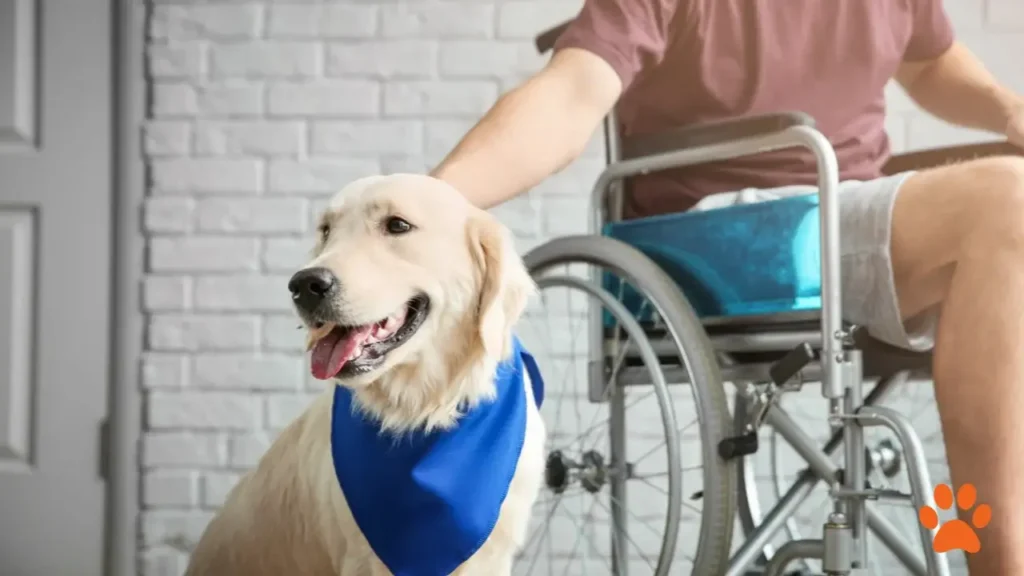
The labrador retriever’s easy-going nature, combined with a keen intelligence, makes them a top choice for assistance in daily life.
As working dogs, labrador retrievers are well-suited to a variety of tasks that aid individuals with disabilities.
Whether it’s retrieving dropped items, providing stability during walks, or offering companionship and emotional support.
Labs are versatile service dogs that can be trained for numerous roles.
- Their friendliness ensures they are approachable and gentle around all types of people, including children.
- Their devotion translates into a close bond with their handler, allowing them to work well harmoniously.
- Intelligence is another key trait; this makes Labs quick learners and responsive to training.
- Known for their athletic build, they can handle physically demanding tasks without strain.
Their multi-faceted capabilities don’t just end with their temperament and build.
Labrador retrievers as assistance dogs have an eagerness to please.
This is critical when navigating the complexities of service work.
They thrive on the sense of purpose that comes with assisting their owners.
They take pride in delivering comfort and aid with unwavering dedication.
When choosing a labrador retriever as your service companion, consider not only the breed’s qualities but also its capacity to enhance your quality of life.
Labs have a storied history of being exceptional assistance dogs.
A testament to their adaptability and heartfelt commitment to their handlers.
Their well-rounded attributes solidify their position as one of the most reliable working dogs today.
Golden Retrievers
If you’re seeking a compassionate and intelligent companion, the golden retriever may be your perfect match.
Known for their warm, approachable demeanor.
Golden retrievers have established themselves as exceptional assistance dogs.
Capable of performing a variety of tasks to aid individuals with different needs.
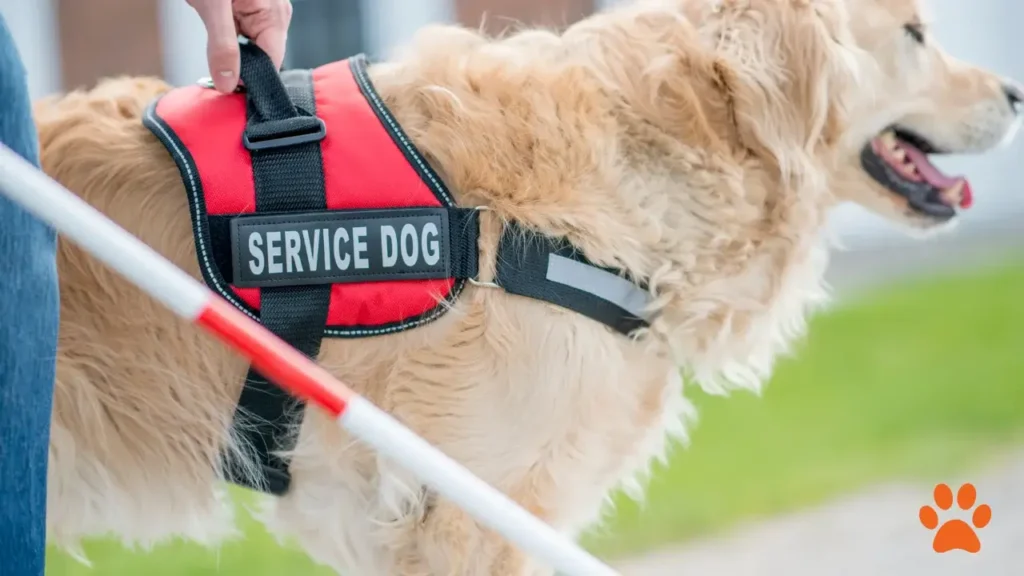
Their ability to excel in service training is rooted in their innate desire to please and their remarkable adaptability to various scenarios and commands.
Through consistent and compassionate service training, these dogs can be prepared to serve as guide dogs.
Offering independence and mobility to visually impaired owners.
But it’s not just their guiding capabilities that make them stand out.
The multifaceted nature of golden retrievers makes them adept at responding to psychiatric needs and offering emotional support as well.
Let’s explore some of the roles these versatile assistance dogs play in supporting their handlers
- Guidance and navigation for the visually impaired
- Alerting their handler to important sounds or alarms
- Retrieving and carrying objects for those with mobility limitations
- Providing balance and support to those with physical disabilities
- Offering comfort and reassurance in times of distress or anxiety
Enriching the lives of those they serve.
Golden retrievers are treasured for more than just their service capabilities.
Their golden coat and expressive eyes bring a sense of joy and serenity to anyone they encounter.
| Characteristic | Contribution to Service Role |
|---|---|
| Temperament | Serene, friendly, and intelligent, facilitating strong bonds with handlers |
| Trainability | Highly responsive to obedience and task-specific training |
| Physical Attributes | Strong and active, able to assist with a variety of physical tasks |
| Sensory Abilities | Keen senses enable them to detect changes in their handler’s environment or health |
| Social Compatibility | Good-natured and approachable, they easily adapt to public settings |
The dedication of a golden retriever in their role as an assistance dog is unmatched.
Their unwavering commitment to their handlers is not only a testament to their loving nature.
It is also to the rigorous and specialized service training they undergo.
Embrace the opportunity to witness the incredible bond between a golden retriever and their handler.
You’ll understand why they are cherished as irreplaceable companions in the realm of service dogs.
German Shepherds
Recognized for their extensive history in various service capacities.
German Shepherds continue to excel in roles that range from guide dogs to essential supporters in service dog work.
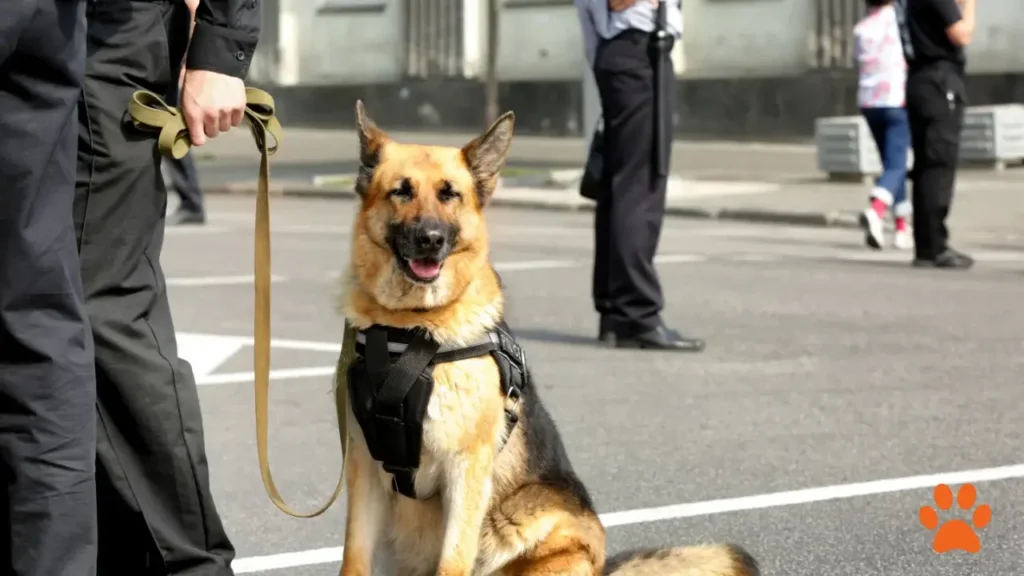
Their unwavering loyalty and versatility have propelled them to become a favorite for aiding individuals, especially in tasks related to mental health.
Let’s delve into the qualities that make these canines unique and effective as service animals.
Historical Significance in Service Roles
German Shepherds gained prominence as the pioneering breed for service roles.
Stepping into the limelight in the 1920s as some of the first guide dogs trained to assist those with visual impairments.
Their impressive record has since grown to encompass various types of service dog work.
Each demanding a high level of intelligence and adaptability.
The Adaptive Intelligence of German Shepherds
The adaptive intelligence of German Shepherds is a core attribute that makes them stand out as service dogs.
These canines demonstrate a keen ability to align their skills with the specific needs of their handlers.
Whether it comes to performing complex tasks, offering emotional support, or providing intervention in mental health crises.
Their cognitive abilities are outstanding.
| German Shepherd Trait | Importance in Service Work | Benefit to Handler |
|---|---|---|
| Intelligence | Essential for learning and executing tasks | Reliable performance of duties |
| Loyalty | Undivided attention to their handler’s needs | Enhanced safety and trust |
| Alertness | Readiness to react to various situations | Timely response in critical moments |
| Adaptability | Ability to handle different environments and tasks | Flexibility in service delivery |
| Sensitivity to mental health | Recognition and response to emotional cues | Support in managing mental health conditions |
If you’re considering a German Shepherd for service dog work, rest assured.
Their qualities align perfectly with the demands of rigorous daily tasks and the emotional depth required to support mental health challenges.
Their storied past, seamless adaptability, and profound loyalty make them an excellent choice for anyone seeking a dependable service dog.
Standard Poodles
If you’re struggling with allergies but need the aid of a service animal, a Standard Poodle might be the perfect fit for you.
Renowned for their elegant, curly coats.
Poodles are also a top choice for hypoallergenic dogs, which means less sneezing and more smiling for sensitive owners.
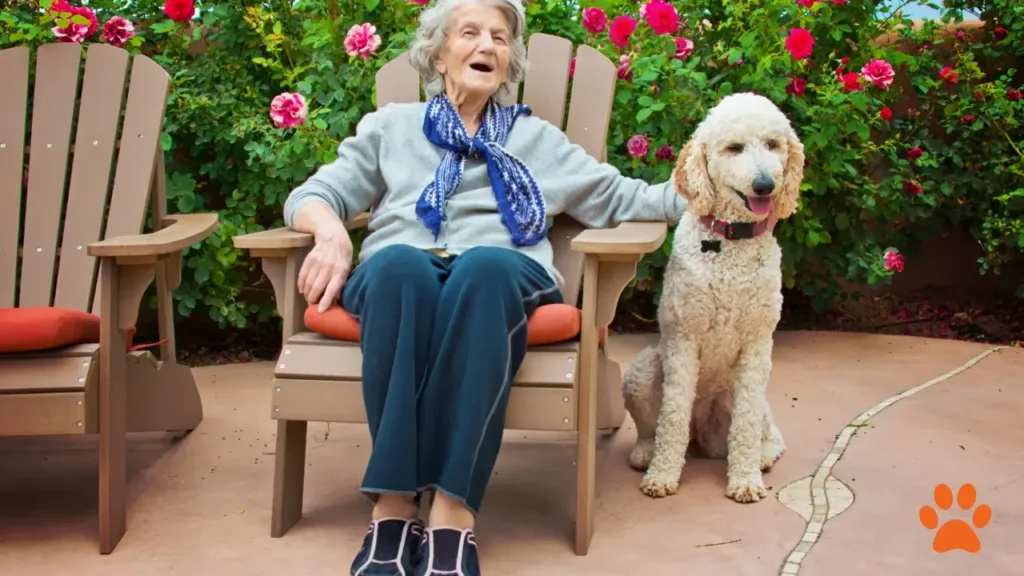
Don’t let their sophisticated looks deceive you.
Standard Poodles are not just show dogs.
They are known for their keen intelligence and are highly trainable.
Making them excellent candidates for a variety of service roles, including as psychiatric service dogs.
Standard Poodles aren’t just good for those with allergies.
They’re also incredibly sociable and tend to have a cheerful disposition.
This temperament makes them adaptable in their roles as service animals.
Capable of offering support across a spectrum of needs from mobility to mental health.
Here’s a closer look at why Standard Poodles truly are a match for service:
- Intelligence: Their smarts make them quick learners for any task you might need.
- Temperament: Standard Poodles are both gentle and eager to please, ideal for service work with those who require a steady companion.
- Physical Build: Well-proportioned and strong, they can assist with tasks that require a bit of brawn.
Take a peek at the table below that highlights the qualities that make Standard Poodles stand out as a top-notch service animal:
| Feature | Benefit |
|---|---|
| Hypoallergenic Coat | Minimizes allergic reactions, making them suitable for allergy sufferers. |
| Intelligence | Allows for remarkable trainability and task execution. |
| Social and Cheerful Nature | Ensures seamless integration into various family and public settings. |
| Versatility in Service Roles | From assisting with mobility to providing psychiatric support, they adapt to diverse needs. |
When considering a Standard Poodle as your service animal, remember they’re not just a stylish choice.
They’re a practical and smart choice for those in need of a devoted companion.
With the capacity to support both physical and mental health challenges.
Standard Poodles represent the versatility and dedication that define the best of service animals.
Bernese Mountain Dogs
When you consider the ideal characteristics for mobility assistance dogs, the Bernese Mountain Dog embodies them with remarkable grace.
Recognized as a versatile breed.
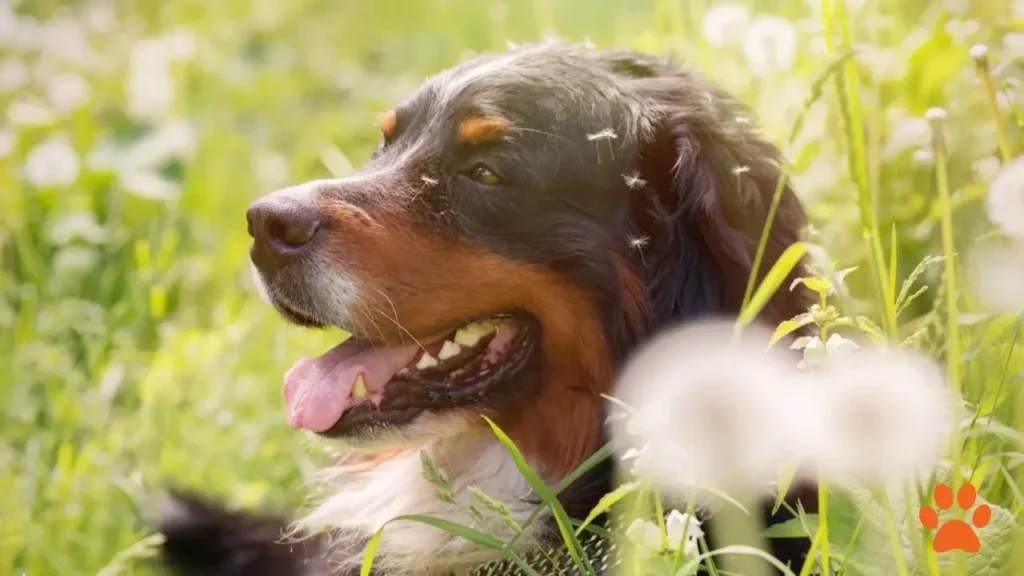
These dogs contribute invaluable assistance and emotional support to their human partners.
Merging their benevolent presence with practical capabilities.
Bernese Mountain Dogs have earned acclaim for their role in service training and as assistance dogs.
Physical Strengths and Support Capabilities
Robust in form.
The Bernese Mountain Dog’s ample size and strength equip them magnificently for tasks requiring physical prowess.
These tasks are essential to those needing support with their mobility.
Imagine having a loyal companion by your side capable of fetching, carrying, and even assisting with the navigation of a wheelchair.
This breed’s ability to provide physical aid is just one aspect of their suitability as assistance dogs.
The Temperaments Suited for Service
The serene nature of Bernese Mountain Dogs is pivotal for successful service dog partnerships.
Their temperament is a harmonious blend of gentleness and patience.
Paired with an eagerness to serve—crucial traits for service work.
Alongside their intelligence and steadfast loyalty, these dogs form close, empathetic bonds with their handlers.
Making them an exemplary choice for anyone seeking the unique qualities that define mobility assistance dogs.
Great Danes
When you think of Great Danes, their majestic presence and towering stature inevitably come to mind.
Yet beyond their physical grandeur lies an extraordinary ability to serve as both a psychiatric service dog and a steady support dog.
These gentle giants possess an inherent calmness and sweet disposition.
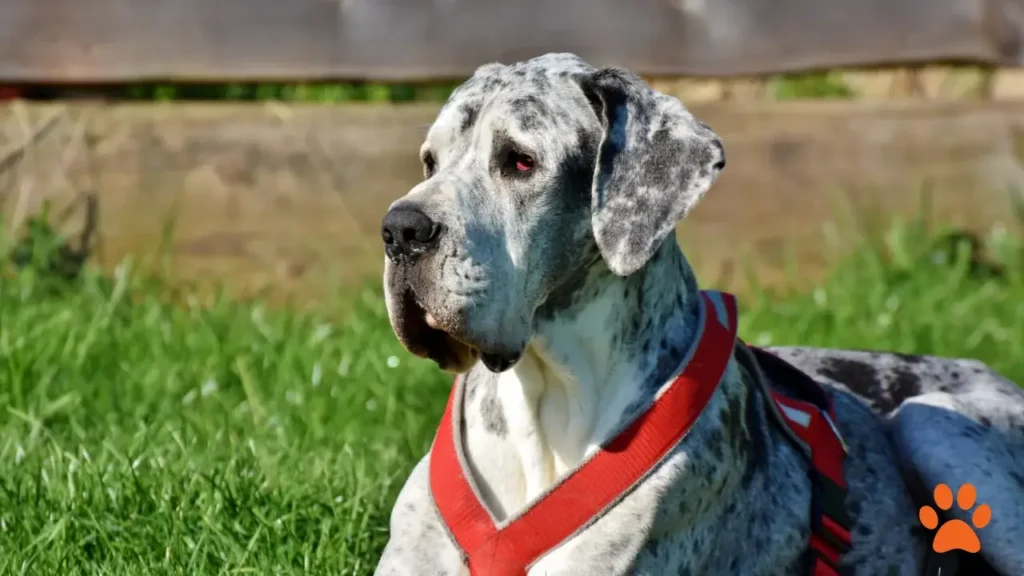
Making them a source of comfort and stability for individuals grappling with mental health challenges.
Great Danes undergo service training that empowers them to assist their handlers in day-to-day activities.
Offering both physical balance for the mobility-impaired and emotional reassurance to those in need of psychiatric support.
Their intelligence only enhances their capability to adapt to specialized service tasks, addressing the unique demands of their role.
- Assistance in stabilizing gait for those requiring support while walking
- Acting as a physical barrier or source of tactile grounding during psychological distress
- Performing household tasks to aid those with limited mobility
- Providing companionship that can alleviate symptoms of anxiety, depression, and PTSD
As a handler, caring for a Great Dane means accommodating their size.
Considerations for space and exercise are paramount.
Despite this, their compatibility with children and the elderly alike—paired with their versatile service abilities—renders Great Danes invaluable companions.
Their role in fostering independence and psychological comfort cannot be overstated.
They offer massive hearts to match their stature in every sense.
| Benefits of Great Danes | Service Tasks They Perform |
|---|---|
| Enhances balance and mobility support | Support in walking and locomotion |
| Offers psychiatric stability | Emotional grounding and crisis intervention |
| Adaptable to diverse handler needs | Task versatility from fetching items to room clearance |
| Child and elder-friendly temperament | Companionship that mitigates various mental health symptoms |
Conclusion
To fully appreciate the spectrum of advantages offered by the various large breed service dogs, one must delve into the unique traits and qualities that each breed brings to the table.
From the unwavering intelligence of Labradors.
To the remarkable strength of Bernese Mountain Dogs.
The choice of breeds available for service roles is indeed impressive.
Each breed stands out not only for their specific skills and capabilities but also for the immeasurable value they add to the lives of their handlers.
Embracing the Benefits of Diverse Service Dog Breeds
Service dogs are more than just companions.
They are lifelines to their handlers, offering support that goes beyond the everyday.
Mixed breeds, too, have begun making their mark.
Praised for their versatility and resilience.
Qualities that often make them great service dogs.
Exposure to the diverse pool of breeds can enlighten potential handlers about the myriad of tasks that service dogs excel in.
Ultimately broadening the horizon of what these extraordinary animals can achieve.
Choosing the Right Service Dog Breed for Your Needs
Choosing a service dog is a critical decision.
One that hinges on understanding the symbiotic relationship between a handler and their service dog.
Evaluating factors such as the specific service tasks needed, the dog’s temperament, and your living situation will guide you towards the best service dog that can accommodate and enrich your lifestyle.
Embrace this journey with the knowledge that selecting the appropriate breed will culminate in a powerful partnership, ensuring great service and a meaningful addition to your life.
Frequently Asked Questions
What Breed Makes The Best Service Dog?
The Labrador Retriever, Golden Retriever, and German Shepherd are widely recognized as the best breeds for service dogs. These breeds are chosen for their intelligence, trainability, and temperament, making them capable of performing a wide range of services, including assistance for individuals with disabilities, therapeutic support, and work in search and rescue operations. Their loyalty and ability to form strong bonds with humans also contribute to their effectiveness as service dogs.
What Is The Best Size For A Service Dog?
The best size for a service dog largely depends on the specific tasks it will perform and the needs of its handler. Medium to large dogs are often preferred for physical support tasks, such as mobility assistance, because they can more easily support weight and maintain stability. Breeds like Labrador Retrievers, Golden Retrievers, and German Shepherds are commonly used. For tasks not requiring physical support, such as alerting to medical conditions, smaller breeds may also be suitable. The key is the dog’s ability to perform its tasks effectively, rather than its size alone.
What Is The Most Obedient Large Dog?
The most obedient large dog breed is often considered to be the German Shepherd. Known for their intelligence, trainability, and versatility, German Shepherds excel in various roles, including service work, police and military duties, and as family pets. Their loyalty and eagerness to please make them highly responsive to training, leading to exceptional obedience. They are well-regarded for their ability to learn commands quickly and perform tasks with a high level of reliability and precision.
What Is The Easiest Large Dog to Train?
The Labrador Retriever is widely regarded as one of the easiest large dog breeds to train. Known for their intelligence, eagerness to please, and friendly nature, Labradors respond well to positive reinforcement training methods. Their adaptability and desire to make their owners happy make the training process enjoyable and effective. This combination of traits contributes to their success in various roles, including as service dogs, in search and rescue, and as beloved family pets.
